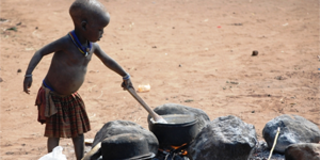Let’s not waver in fight against hunger

Hunger, which is looming in the region, has forced many young children to take over adult roles like preparing meals for each other like this child whose mother has to trek long distances in search of more food for her children. This child was preparing a meal of posho for her siblings. PHOTO/FILE/STEVEN ARIONG
What you need to know:
- Jacqueline Samalie Nalukwago says: Can Ugandans fully participate in government initiatives like the Emyooga scheme without alleging they are for a select few?
Uganda is one of the leading agricultural producers in Africa with agriculture being its backbone.
This is mainly attributed to its fertile soils and sufficient rainfall throughout the year. In fact, agriculture is increasingly contributing to the country’s economic growth.
Despite this, Uganda continues to have citizens who can’t afford a day’s meal. For many of those who can afford, they rely on foods like matooke which has few nutritious values.
It is also worth noting that many people go to bed hungry. In a report released this month, Oxfam International reveals that since the Covid-19 outbreak, deaths from hunger are outpacing deaths from the virus with 11 people dying from hunger every minute compared to 7 people dying from Covid-19. The country has during this lockdown recorded deaths resulting from hunger.
These point to a glaring need for more food security policies to improve food access. It is noteworthy that government has taken strides through implementing programmes to fulfill its obligation of ensuring food security for Ugandans through ministerial projects, district nutrition initiatives, Operation Wealth Creation etc. Special recognition goes to the NGOs and donor community for the endless support they have accorded Ugandans towards this cause.
Still, Uganda’s potential for food security remains untapped and unlocking it requires practical on ground effort.
The lack of sufficient and weather resistant storage capacity at farm level and in households leads to losses. Pests and diseases cause crop failure and livestock death. Increasing food prices erode people’s purchasing power, especially among low income earners hence causing food insecurity. In the northern and eastern regions, scarcity of rain water which is largely relied on results into low crop yields thereby creating serious implications, not forgetting the lack of drought-resistant and disease-free seeds.
As a result of these and other factors, cases of malnutrition, especially among children are still rampant. This has forced some to drop out of school, which of course, hinders their potential to kick poverty out of their lives. Poor feeding has contributed to complications among pregnant women and maternal mortality.
Whereas some market traders can afford a day’s meal, they choose to sell the nutritious foodstuff and feed on the remainder, in order to earn a living.
The state of food security in the country calls for collective efforts. While speaking to a visiting friend from South Africa, she expressed shock at the amount of food Ugandans dispose of after each meal. Can we as Ugandans look out for disadvantaged homes in our neighbourhood and share part of our food rather than preparing huge amounts that we can’t complete?
Can women be accorded maximum rights to land access to boost food growth? It should be noted that many resources like land, due to custom, are directed towards men yet women are responsible for the bulk of agricultural work.
Can Ugandans fully participate in government initiatives like the Emyooga scheme without alleging they are for a select few? Can requirements for benefiting from these programmes be loosened to reach those targeted? Can traders stop taking advantage of situations like this lockdown to hike food prices?
By and large, joint efforts are required to address food challenges for attainment of zero hunger in the country. More research should be carried out for findings that can aid decision making towards food fortification. Most importantly, food reserves should be established across the country to increase food access during food shortage periods.
I, therefore, call on Ugandans to take advantage of existing government programmes to promote food security and as well take it upon themselves to fight hunger at an individual level. Hunger contributes to poor health, disease, death which exacerbates poverty and consequently hinders sustainable development.
Jacqueline Samalie Nalukwago, [email protected]




